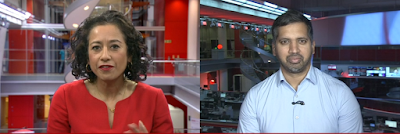For transcript fans, here's one featuring the BBC's economics editor Faisal Islam talking to Samira Ahmed on this week's Newswatch about the challenges of reporting government spending reviews and Budgets...
Samira Ahmed: Not everyone finds it easy to get their heads around those numbers, not only because they are large but, in the case of a Spending Review or a Budget, there are simply so many them. And as the report released by the Office of National Statistics on Wednesday found, a large proportion of people lack a basic understanding of economic statistics such as employment figures or the deficit and also mistrust official data. That is one of the challenges faced by Faisal Islam, who joins me now from our camera position upstairs in the newsroom. Welcome to Newswatch. Even if we are not in a pandemic, the spending review would be a huge task for you to process and explain, can you briefly talk us through how you go about doing that?
Faisal Islam: In the days running up to it, we obviously try and scope out exactly what the broader parameters and exactly how much is going to be spent. You tend to get quite a lot of it pre-announced by the Treasury, a mixture of leaks, unauthorised, but also actually the announcements that are going to come on the following Wednesday happening during the course of the previous few days. We have to analyse there. There is a particular challenge there because you don't get all the information, so you might get a partial announcement, the full announcement is to come a few days later, so you have to be wary of exactly what is being communicated.
Samira Ahmed: And, Faisal, you have already hinted at that one of the concerns that viewers have, which is how far you should be reporting government leaks and rumours put out beforehand. If you take the example of the cut in the foreign aid budget, which was definitely leaked well in advance, do you ever feel that you are being played?
Faisal Islam: I think whenever you get a piece of information unofficially, you do have to process the motive for getting that piece of information, kick the tires on it, make sure that it isn't only being given to you in a partial way so that it will be reported in a slightly...with a lack of nuance. You have to be aware of the basis upon which information is turning up in your inbox or on your WhatsApp or your messages or occasionally by carrier pigeon. You have to be aware of why you are getting that information and how you report it. But I tend to find that actually it is worth just waiting a little bit until the official information comes out and you can fully assess the context of that government announcement. But I think it would be naïve to assume that you would never report these things in advance. These discussions and debates are happening in private. Good journalists would want to be in on that. But you are right to say that we should put a certain health warning on the quality of some of that information that comes through before it is official.
Samira Ahmed: The Office for National Statistics this week reported that most people don't really understand very much about economic data and its terms, and I wonder if you shouldn't be doing even more to explain, to spell out the difference between say debt and deficit, some of these concepts, for viewers.
Faisal Islam: Yes, and it think it depends on the outlet as well. But you are absolutely right. I would say that there are twin deficits, but this would run up against the problem, even in my answers, the twin challenges is probably what I should say, of complexity and controversy. And we need to be able to guide viewers, listeners, readers, through all of that. On complexity, it is true that we have to bear in mind some basic concepts for an economic audience or a political audience, such as the deficit, needs to be unpacked but I also think there is a challenge as well with brevity. If you try to explain with a sentence or a couple of sentences every single thing every time you said that, you would never actually say anything.
Samira Ahmed: The numbers that we are now talking about because of the pandemic are so huge - you know, the scale of borrowing - it can be hard for many of us to grasp. But equally, I'm wondering as an economist yourself, when you report that we're talking about the biggest debt situation for 300 years, is that actually a bit scary, even for you?
Faisal Islam: Yes. I mean, I think you to bear in mind, it is not our job to scare anybody. It is our job to inform people. I think one was to communicate to that and give context to that is to give historical comparisons. You mentioned the borrowing as a proportion of our national income, the largest since World War II. Perhaps a better way, which is one that I tried to use to explain it, is that we have only seen this level of borrowing in world wars. So that gives you a letter idea of the scale of the crisis that the Government has dealt with. It's like a world war. You need to come up with ways of explaining things that bring alive a decimal point or a percentage and give some context to the challenge. But it is a challenge and it is not surprising that some would feel that this is daunting. It is daunting, but there are obviously ways through it.
Samira Ahmed: Faisal Islam, thank you so much.

No comments:
Post a Comment
Note: only a member of this blog may post a comment.